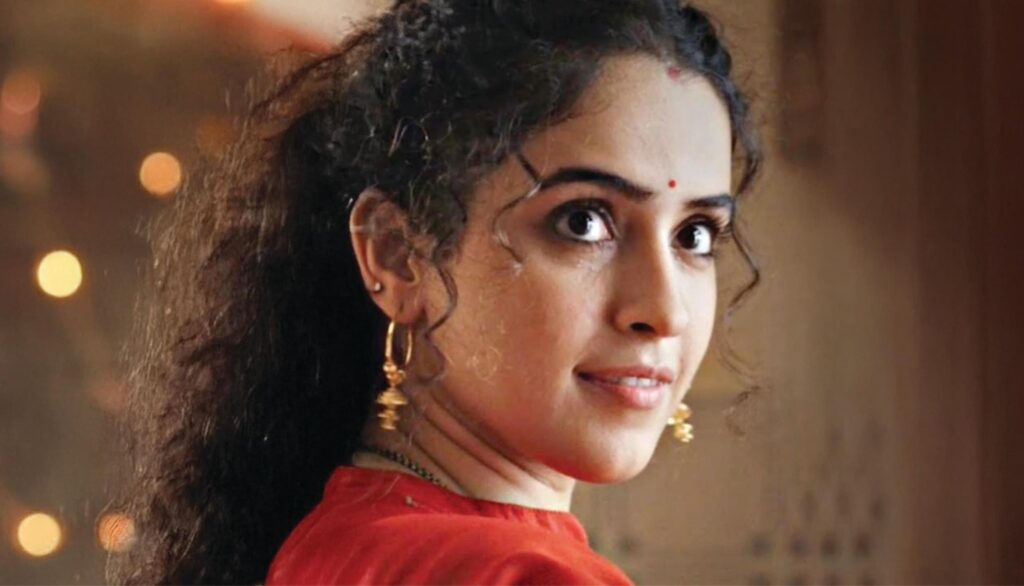Aarti Kadav’s Mrs., produced in 2023 and currently streaming on Zee5, delves into the Sisyphean struggle of women tethered to domesticity. While echoing the potent feminist outcry of Jeo Baby’s The Great Indian Kitchen (Malayalam, 2021), the Hindi remake, offers a less searing exploration of similar thematic terrain.
Richa (Sanya Malhotra), a trained dancer and dance instructor, marries Diwakar (Nishant Dahiya), a workaholic doctor, and joins his family — father Ashwin (Kanwaljeet Singh) and mother Meena (Aparna Ghoshal). Within the Kumar household, under Meena’s tutelage, Richa is forced to conform to the established order, where women occupy a preordained domestic sphere. She quickly learns that her domain is the kitchen. When Meena departs for America to attend to her expectant daughter, Richa finds herself solely responsible for the gruelling task of caring for Diwakar and Ashwin…
Mrs. is a slow-burn social drama, deliberately paced yet consistently propulsive. Each day unveils a new layer of Richa’s domestic indoctrination: from the imperative of serving hot phulkas to her beloved husband and the seemingly doting father-in-law, to the unwritten rules of kitchen hygiene, the enzymatic benefits of stone-ground chutney, and the ritual of laying out her husband’s clothes. The men in the household epitomize entitlement with their status as past or present breadwinners granting them unspoken privileges. Food becomes a tool of control, wielded by the men in the household and internalized by the women who serve them. The hypocrisy of the men is further exposed when, during a moment of crisis, they readily accept the help of a lower-caste woman—a woman toward whom the family normally harbours reservations—to cook and clean the house.
The film also highlights how women themselves are complicit in perpetuating this endless cycle. Meena, despite holding a PhD in economics, has prioritized her home and children. She, in turn, demands culinary perfection from Richa, inducting her into this system. Even Guddu (Loveleen Mishra), Ashwin’s sister, arrives to temporarily replace Meena and guide Richa through her first Karwa Chauth. Thus, both women become enforcers of this oppressive system. Within this context, Richa’s desire to pursue her passion for dance or even a modicum of intimacy with her husband is met with stark disapproval. Her plea for a plumber to fix the dripping kitchen pipe—a leak symbolically representing the need for repair within the relationship itself—is ignored. The meticulous, almost ritualistic, cooking process further underscores the stifling nature of these domestic expectations and entrapment. Kadav deftly dissects these societal norms and the cyclical nature of women’s confinement to the domestic sphere, eschewing sentimentality for a straightforward approach to reality.
On the flip side, Mrs. diverges from its source material and stops short of fully exploring the story’s most troubling dimensions. The nameless protagonist in Jeo Baby’s The Great Indian Kitchen endured not only the relentless demands of domestic labour but also the insidious prejudice of being deemed ritually impure during menstruation. Nimisha Sajayan’s character in the Malayalam version was confined and ostracized during her period, forbidden even from touching the sacred tulsi plant. Here, however, when Richa menstruates, she is allowed to rest, free from her chores, and spend time alone, which underscores the film’s less confrontational approach to the subject matter. Crucially, the former film never glamorized the act of cooking, unlike Mrs., where such depictions dilute the very point of their inclusion. Consequently, Richa’s final outburst lacks the visceral justification of its predecessor, resulting in an underwhelming payoff. Even the dance performance, a powerful act of release and self-discovery in the original, feels here like a mere concession to spectacle, adding a little weight to the narrative.
Sanya Malhotra’s nuanced and effective portrayal of her character’s internal turmoil is yet another testament to her remarkable acting calibre. Complementing her abilities is Kanwaljeet Singh, who plays her father-in-law. He is a man of few words and his presence is marked more by charged silence than explicit expression. He remains observant when pleased, yet readily offers curt remarks when peeved. Nishant Dahiya’s Diwakar is defeated by an an underwritten character, the film squandering the potential to explore the complexities of a modern husband-wife dynamic. Aparna Ghoshal imbues her brief screen time with a subtle yet compelling presence. Loveleen Mishra, enacts her brief role with aplomb while Varun Badola brings a disarming charm to his role.
Pratham Mehta’s cinematography powerfully captures the protagonist’s anguish, making her burdens palpable through contemplative close-ups. The drama unfolds mostly within the claustrophobic confines of the house, often in the hushed intimacy of bedrooms or the stifling space of the kitchen, and the choice of framing makes it all the more impactful. Prerna Saigal’s taut editing maintains a relentless rhythm, building narrative momentum and keeping us in a constant state of engagement. Sarit Sekhar Chatterjee’s sound design is most eloquent in the silences and halting conversations, where unspoken meanings emerge from the gaps between words. In this subdued drama, the soundscape itself becomes a character, revealing the unspoken most effectively.
While Mrs. effectively captures the suffocating nature of traditional expectations, it is let down by its reluctance to confront the complexities of its chosen subject matter headon. As such, it’s a film that creates some sparks, even if it doesn’t fully ignite the necessary fire.
Hindi, Drama, Color


